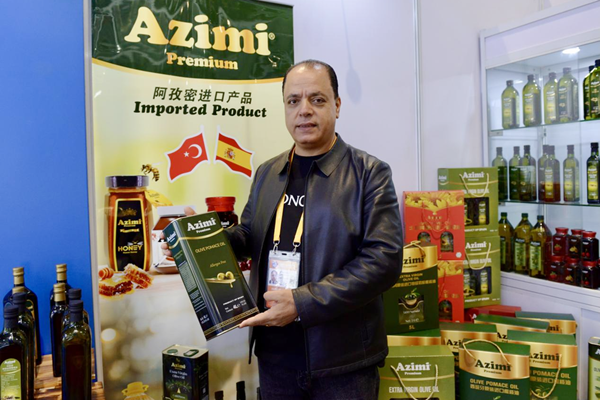
Search history
Clear allSearch by image
XDrag and drop an image here or upload an image
Max 5MB per image
UploadSign In | Join

Search history
Clear allSearch by image
XDrag and drop an image here or upload an image
Max 5MB per image
UploadSign In | Join
X Email Mobile

H. Qayoum Azimi, CEO of the Azimi Brothers Group, introduces the imported olive oil at the fourth China International Import Expo in Shanghai, on Nov 8, 2021. [Photo by Zhao Shiyue/chinadaily.com.cn]
When Afghan businessman H. Qayoum Azimi took part in the first China International Import Expo three years ago, he was amazed by the vast Chinese market and its huge population, and immediately decided to tap into the import food wholesale business opportunities in China.
Azimi, who first arrived in China in 1998, has been working and living in Yiwu, East China's Zhejiang province, for over 20 years. Also known by his Chinese name Jin Fei, he is always called Old Jin by others, and speaks fluent Chinese with slight Zhejiang accent.
Jin runs the international trade company Azimi Brothers Group, exporting a variety of low-priced small commodities from China to Afghanistan.
"China is the world's biggest market for us," said the seasoned merchant, who has participated in the CIIE for four consecutive years from 2018 to 2021, with Afghan saffron, Turkish honey, chocolates, and olive and sunflower seed oil on display for visitors.
"The import expo serves as the best platform for me to search for agents and distributors domestically, and there will be new orders flowing in every year I come," he said.
Jin also spoke highly of China's Belt and Road Initiative, which greatly facilitated bilateral trade, and the further shortening of the transit time of goods. "It takes about 12 days on the road from Afghanistan to China by freight trains, in a quite fast and convenient way."
To further encourage foreign investment, the government exempts the storage fee of goods at customs, according to Jin, and offered a three-year rent-free period for his offline store in the Yiwu import market, with living subsidies in various aspects.
Seeing China as "a second home", Jin has deep emotional connections with the country, where he grew from an Afghan youth to the successful CEO managing millions of yuan of transactions, thanks to China's burgeoning market and the opening-up that empowers new opportunities around the globe.
Until now, two of his sons are studying at universities in China, committing to master's and doctoral degrees in Shanghai and Hebei province.
Although the COVID-19 pandemic dealt a heavy blow to the global economy, and Jin's import business has not been flourishing as expected, he still believes in the future.
"No matter how bad it seems today, everything will be all right tomorrow," Jin said with optimism, "since I know when problems come up, there is always someone behind us, giving us a helping hand."
In 2020, he set up a company in Shanghai - Angel Hands - to deal with the import business, with 95 percent generated by Chinese consumers.
About a month ago, Koirala got a booth at the Nepal Import Pavilion, part of the CIIE platform offered for foreign exhibitors, at Greenland Global Commodity Trading Hub (G-Hub).
So far, the G-Hub features 180 merchants from 76 countries and regions, such as Syria, Cuba, Pakistan, Peru and Cambodia.
It remains open year-round to visitors, helping global vendors reach Chinese buyers, and enhance cultural communication.
Sun Chenghai, deputy director of the CIIE Bureau, said a total of 90 companies from 33 of the world's least-developed countries participated in the CIIE this year, with the country exhibition area witnessing the debut of 15 countries, such as Brunei, Syria, Mauritius, Palestine and Algeria.
"The CIIE builds a platform for constructing a community with a shared future for mankind, ushering in opportunities for both developed and developing nations," he said.
Source:By Zhao Shiyue in Shanghai | chinadaily.com.cnhttp://yiwuzhejiang.chinadaily.com.cn/2021-11/11/c_680943.htm
TOP